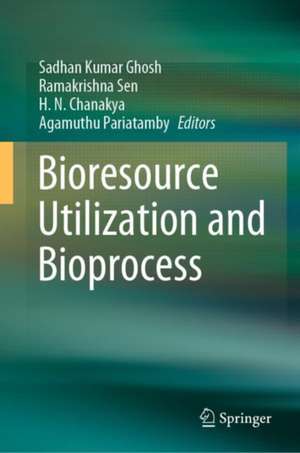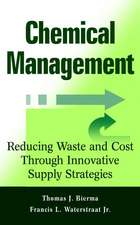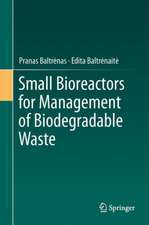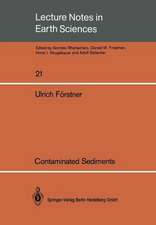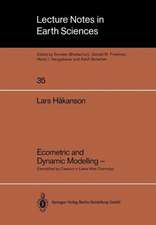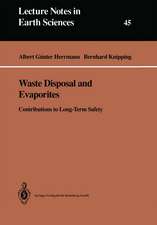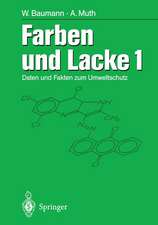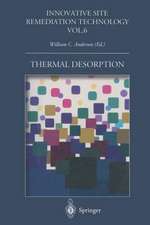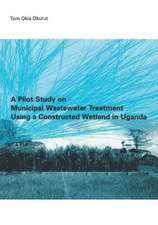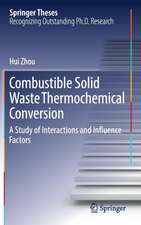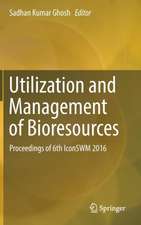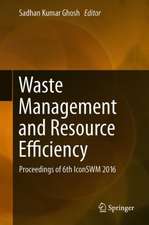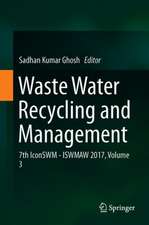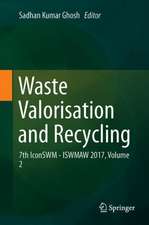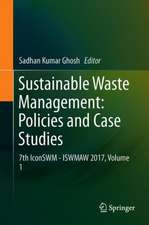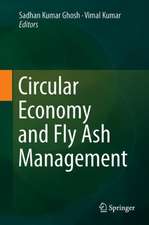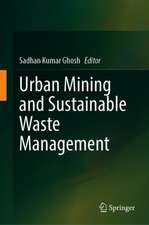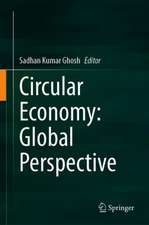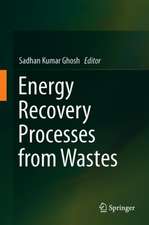Bioresource Utilization and Bioprocess
Editat de Sadhan Kumar Ghosh, Ramakrishna Sen, H. N. Chanakya, Agamuthu Pariatambyen Limba Engleză Hardback – 28 mar 2020
| Toate formatele și edițiile | Preț | Express |
|---|---|---|
| Paperback (1) | 783.00 lei 38-44 zile | |
| Springer Nature Singapore – 28 mar 2021 | 783.00 lei 38-44 zile | |
| Hardback (1) | 950.66 lei 6-8 săpt. | |
| Springer Nature Singapore – 28 mar 2020 | 950.66 lei 6-8 săpt. |
Preț: 950.66 lei
Preț vechi: 1159.34 lei
-18% Nou
Puncte Express: 1426
Preț estimativ în valută:
181.90€ • 190.44$ • 150.52£
181.90€ • 190.44$ • 150.52£
Carte tipărită la comandă
Livrare economică 05-19 aprilie
Preluare comenzi: 021 569.72.76
Specificații
ISBN-13: 9789811516061
ISBN-10: 9811516065
Ilustrații: XIV, 273 p. 137 illus., 118 illus. in color.
Dimensiuni: 155 x 235 mm
Greutate: 0.59 kg
Ediția:1st ed. 2020
Editura: Springer Nature Singapore
Colecția Springer
Locul publicării:Singapore, Singapore
ISBN-10: 9811516065
Ilustrații: XIV, 273 p. 137 illus., 118 illus. in color.
Dimensiuni: 155 x 235 mm
Greutate: 0.59 kg
Ediția:1st ed. 2020
Editura: Springer Nature Singapore
Colecția Springer
Locul publicării:Singapore, Singapore
Cuprins
Chapter 1. A Comprehensive Study of Food Waste to Biogas Plant: Paths to Improve the Performance – A Case Study.- Chapter 2. Resource Recovery From Organic Fraction Of Municipal Solid Waste Using Anaerobic Digestion And Hydrothermal Carbonisation.- Chapter 3. Effect of Inoculation on Anaerobic Digestion of Food Waste.- Chapter 4. Bio Sorption of Cr (VI) From Aqueous Solutions by Pericarp of Pongamia Pinnata.- Chapter 5. A Comparative Study of the Fuel Characteristics between Algal Biodiesel and Petro-Diesel.- Chapter 6. Production of Bioethanol from Green Alga Chlorella Vulgaris: An Important Approach to Utilize Algal Feedstock or Waste.- Chapter 7. Biogas Production from Fat, Oil, Grease and Effect of Pre-Treatment.- Chapter 8. Predicting Biomethanation Pattern from Feedstock Composition for Biomass Residues.- Chapter 9. Yield Improvement of Biodiesel from Chlorella Vulgaris by Media Optimisation and Transesterfication.- Chapter 10. Synthesis of Cellulose from Peanut Shell Waste and its use in Bioethanol Production.
Notă biografică
Prof. Sadhan Kumar Ghosh, Ph.D. (Engg.), Dean, Faculty of Engineering & Technology & Professor, Jadavpur University, India, is an internationally renowned figure in the fields of waste management, supply chain management, circular economy, green manufacturing, low-carbon technologies, and ISO standards, has authored 210 publications, and edited 30 books/proceedings. He has participated in research collaborations in 34 countries, and his projects have been funded by EU Horizon 2020 (2018), the Royal Academy of Engineering, Government of India, etc. He was an International Expert/Consultant for the UN DESA/UNCRD in 2016 and APO in 2014. He holds 2 Indian patents and 1 in Bangladesh.
Dr. Ramkrishna Sen, Ph.D. (Eng.), is a Professor of Biotechnology, IIT Kharagpur. He served on a Fulbright Visiting Professor Fellowship at Columbia University and has pursued R&D activities in Healthcare, Energy, Environment & Water, focusing on Green Processes & Product Development for anticancer biomolecules; marine bacterial green surfactants; microbial and microalgal biorefineries for biofuels, and value-added products with concomitant CO2 sequestration and waste valorization. He has authored 200 publications, holds 1 patent, and wrote the book ‘Biosurfactants.’
Hoysall N. Chanakya, Ph.D. (Microbiology), is Chief Scientist at the CST (formerly ASTRA Center), Associate Faculty at CiSTUP, CCS & the National Coordinator of the Indo-UK project on hybrid energy RHEES at the Indian Institute of Science, India. His R&D efforts concern the following broad areas: Biomethanation, AD and W2E, Wastewater Purification, Decentralized/Sustainable Rural Energy, Participatory Technology Development & Appropriate Technologies. He has authored 250 publications.
Dr. Agamuthu Pariatamby, FASc, Professor at Sunway University China, served 43 years in UM and is the Founder-President of the Malaysian Society of WM and Environment. He is theVice-President/International Advisory Board Member for SWAPI, and an Honorary Member of the International Society of Waste Management, Air and Water. He is the Founder-Head of the Center for WM Research, UM. He is the Editor-in-Chief of the International Waste Management & Research Journal and the Malaysian Journal of Science, and has authored 460 publications and numerous books on Solid Waste. He is a Fellow of the Academy of Science, Malaysia, and of the IGES, Japan.
Dr. Ramkrishna Sen, Ph.D. (Eng.), is a Professor of Biotechnology, IIT Kharagpur. He served on a Fulbright Visiting Professor Fellowship at Columbia University and has pursued R&D activities in Healthcare, Energy, Environment & Water, focusing on Green Processes & Product Development for anticancer biomolecules; marine bacterial green surfactants; microbial and microalgal biorefineries for biofuels, and value-added products with concomitant CO2 sequestration and waste valorization. He has authored 200 publications, holds 1 patent, and wrote the book ‘Biosurfactants.’
Hoysall N. Chanakya, Ph.D. (Microbiology), is Chief Scientist at the CST (formerly ASTRA Center), Associate Faculty at CiSTUP, CCS & the National Coordinator of the Indo-UK project on hybrid energy RHEES at the Indian Institute of Science, India. His R&D efforts concern the following broad areas: Biomethanation, AD and W2E, Wastewater Purification, Decentralized/Sustainable Rural Energy, Participatory Technology Development & Appropriate Technologies. He has authored 250 publications.
Dr. Agamuthu Pariatamby, FASc, Professor at Sunway University China, served 43 years in UM and is the Founder-President of the Malaysian Society of WM and Environment. He is theVice-President/International Advisory Board Member for SWAPI, and an Honorary Member of the International Society of Waste Management, Air and Water. He is the Founder-Head of the Center for WM Research, UM. He is the Editor-in-Chief of the International Waste Management & Research Journal and the Malaysian Journal of Science, and has authored 460 publications and numerous books on Solid Waste. He is a Fellow of the Academy of Science, Malaysia, and of the IGES, Japan.
Textul de pe ultima copertă
This book focuses on the utilization of bio-resources and their conversion pathways for a sustainable future. Tapping into bio-resources by means of thermochemical and biochemical processes has attracted researchers from all over the world; it is a broad area that has given birth to concepts like the biorefinery, as well as a new stream known as biotechnology. Its scope includes biochemical and microbiological engineering, biocatalysis and biotransformation, biosynthesis and metabolic engineering, bioprocess and biosystem engineering, bioenergy and biorefineries, cell culture and biomedical engineering, food, agricultural and marine biotechnology, bioseparation and biopurification engineering, bioremediation and environmental biotechnology, etc. The book discusses a host of new technologies now being used to tap these resources with innovative bioprocesses. All chapters are based on outstanding research papers selected for and presented at the IconSWM 2018 conference.
Caracteristici
Discusses new methods for utilizing bio-resources Describes innovative waste management practices to achieve sustainability Offers a good reference guide for future work
